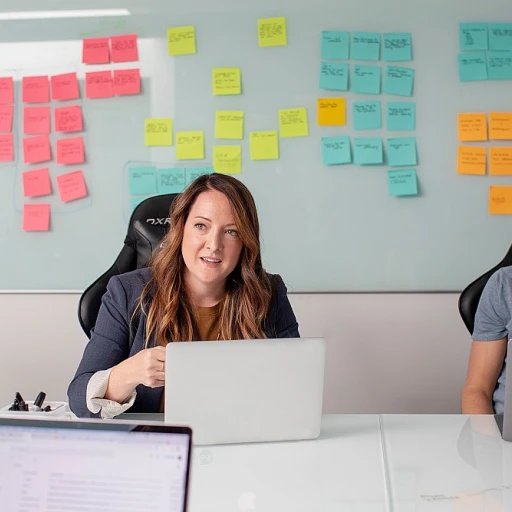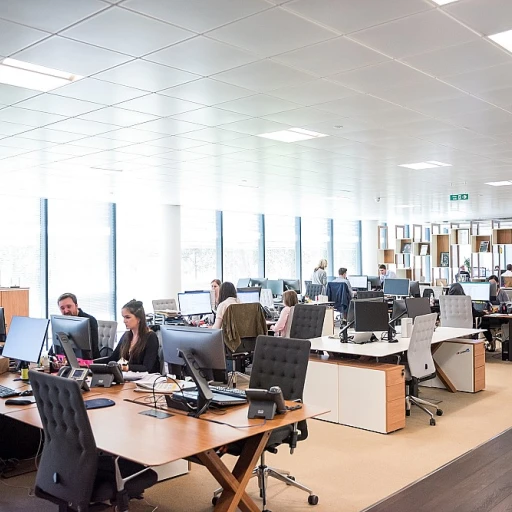Understanding the Skills Development Facilitator
Exploring the Skills Development Facilitator's Role
In the dynamic landscape of career development, the role of a Skills Development Facilitator (SDF) is pivotal. Focused on unlocking employee potential, an SDF is an integral part of a business's strategy for fostering education training and career growth. But what exactly does a Skills Development Facilitator do? And why is their role so crucial in today’s employment market?
An SDF acts as the liaison between employees and the organization, helping to cultivate personalized learning journeys. They work to align individual career paths with the company's goals, ensuring that all training programs and development plans meet both employee and organizational requirements. By facilitating learning interventions and creating a structured annual training plan, they assist in aligning the workforce skills with the strategic objectives of the company, including those mandated by South Africa's Skills Development Act.
From designing and implementing courses to monitoring their impact, the SDF tailors these education initiatives to bridge existing skill gaps. Their efforts are critical not just for personal growth but also for meeting compliance needs and employment equity targets, which are essential components of business operations in South Africa.
The facilitator's work often involves engaging with the Sector Education and Training Authorities (SETA) to ensure that the company's skill development approaches are in line with national standards. This partnership is key to facilitating career progression and ensuring that the workforce is continually refreshed and up-to-date with the latest industry standards and skills.
By promoting a culture of continuous improvement and adaptability, SDFs help companies foster an environment where development training is not just encouraged but is a fundamental part of the workplace culture. As a result, employees are more engaged, motivated, and prepared to meet future challenges.
Learn how early engagement can complement the contributions of SDFs in enhancing employee career pathsThe Impact of Personalized Learning Paths
Personalizing the Learning Experience
Understanding the significance of personalized learning paths is paramount in today's workplace. With the aid of a skilled development facilitator, organizations can craft learning interventions that cater to the specific skills and career aspirations of each employee. This approach not only respects individual learning preferences but also aligns with the company's business goals and employment equity requirements. Personalized learning empowers employees by aligning their career development with the company's objectives. A well-constructed skills plan and targeted training programs can bridge gaps effectively, meeting both immediate and long-term goals. When employees partake in learning paths that resonate with their personal and professional ambitions, businesses are likely to see enhanced engagement and productivity. For organizations in South Africa and beyond, adhering to SETA guidelines and integrating a Skills Development Facilitator (SDF) into their strategy is essential for compliance and effective skills management. By planning annual training interventions tailored to the unique requirements of each team member, companies not only enhance their talent pool but also support continuous improvement and sustained growth. For more insights on creating tailored learning strategies that foster engagement and development, consider exploring additional resources on crafting tailored strategies for employee engagement.Bridging Skill Gaps in the Workplace
Addressing Workforce Competencies
Businesses today face a dynamic and ever-evolving labor market that requires swift adaptation and skill acquisition. A critical function in this context is identifying and addressing skill gaps within the workplace. As an integral part of the skills development process, the role of the development facilitator is to assess the competencies of the workforce and coordinate with management to determine priority areas for development.
Through detailed skill assessments, development facilitators are able to create effective training plans that align with the organization's strategic goals and the employees' career aspirations. By analyzing skills requirements and leveraging personalized learning interventions, companies can create a comprehensive skills development plan that not only bridges existing skill gaps but also promotes career development across the workforce.
Customized Training Programs for Skill Acquisition
One of the primary tools for bridging skill gaps is through customized training programs. These programs are tailored to the specific needs of an organization or a department, ensuring a focused approach to skill enhancement. The skills development facilitator plays a crucial role in devising these programs, ensuring they are both compliant with industry standards and aligned with the South African SETA guidelines.
Development facilitators meticulously plan and monitor courses and training certification processes to ensure successful outcomes. They coordinate with various stakeholders to facilitate career counseling and support employee education training activities. By implementing annual training reports and engaging in employment equity considerations, facilitators ensure that the entire training cycle aligns with the broader objectives of the company.
Fostering Employee Engagement through Continuous Improvement
Effective skill development not only fills critical skill gaps but also boosts overall employee engagement. This process is achieved by creating a culture of continuous improvement where employees are motivated to enhance their skills proactively. Encouraging participation in a variety of professional development courses and learning paths is a key component.
Moreover, fostering such a culture involves recognizing the efforts of employees who actively engage in their own development journey. This can be complemented by humorous employee appreciation initiatives that further enhance morale and participation. As employees feel supported in their career development, they become more committed to the organization's success, ultimately benefiting both the individual and the company.
Fostering a Culture of Continuous Improvement
Creating an Environment that Embraces Ongoing Development
In today's fast-paced business landscape, continuous improvement is not just a trend; it's a necessity for a thriving workplace. Facilitating a culture that supports ongoing development is crucial for any business striving to stay competitive. Skills development facilitators (SDFs) play an essential role in fostering this culture by designing tailored learning interventions that meet both the company’s objectives and individual career aspirations.
Integrating Learning into Daily Practices
To cultivate an environment of continuous improvement, companies must integrate learning into everyday routines. This starts with crafting a skills plan that aligns with the company’s strategic goals while accommodating the personal development needs of employees. Businesses that implement training programs and courses aligned with the requirements of the labor market are better equipped to bridge any skills gaps, ensuring compliance with employment equity and BEE standards while enhancing overall workforce performance.
Promoting Self-Directed Learning
Giving employees the autonomy to explore their career development paths through self-directed learning can significantly enhance engagement. SDFs can empower workers by providing access to a diverse array of education training resources and facilitating career counseling. This approach encourages employees to take ownership of their learning journey, cultivating a proactive mindset towards skill acquisition and application.
Leadership and Management Support
Leadership plays a vital role in nurturing a culture of continuous improvement. Managers and business leaders must be actively involved in supporting development initiatives by promoting annual training plans, endorsing training certification opportunities, and demonstrating a commitment to employee growth. Development facilitators are instrumental in facilitating career discussions between leadership and employees, aligning personal ambitions with organizational goals.
Emphasizing Feedback and Reflection
Feedback loops are an integral component of continuous improvement. Regular training reports and progress evaluations not only help measure the success of skills development initiatives but also provide valuable insights into areas for improvement. Encouraging a culture of reflection allows employees to assess their learning experiences and set future objectives, thereby reinforcing a cycle of ongoing development.
Leveraging Technology for Skills Development
Utilizing Technology in Workforce Training
In today’s fast-paced business environment, the effectiveness of skills development within organizations heavily depends on the strategic incorporation of technology. The role of technology in facilitating enhanced learning experiences allows businesses to stay adaptable in the dynamic labor market. The modern workplace thrives on digital solutions, and learning management systems (LMS) have become integral in structuring customized training programs. An effective LMS can streamline various processes— from tracking skills plan compliance to ensuring education training aligns with career development goals. This digital approach encourages a seamless blend of traditional education methods with innovative technologies. Employers are now turning to interactive e-learning platforms and mobile applications to create personalized learning interventions. Such platforms enable employees to access training modules, general courses, and development training at their convenience. SDFs can leverage these tools to ensure that the workforce's training requirements are met efficiently, supporting broader employment equity and career counseling initiatives. In the South African context, compliance with SETA regulations demands that businesses enhance their workplace skills plans regularly. Technology not only facilitates real-time data collection but also assists in generating comprehensive training reports for critical evaluations. More importantly, integrating AI and machine learning can offer predictive insights, suggesting the skills necessary for future workplace requirements. This proactive approach aids in bridging existing skill gaps and fostering a culture of continuous improvement. Ultimately, technology serves as a powerful ally to development facilitators in supporting employees' growth and organizational success. By implementing advanced tech solutions, businesses can enhance their skills development initiatives, meet annual training and career development targets, and maintain robust training certification standards.Measuring the Success of Skills Development Initiatives
Assessing the Effectiveness of Skills Initiatives
To ensure that the efforts invested in skills development are meeting the objectives, businesses need to measure the success of their initiatives. This requires a structured approach to evaluating the impact of development training on both individual and organizational levels. Here's how companies can effectively measure the success of their skills development programs:
- Tracking Progress Over Time: It is important for businesses to regularly review the progress of employees against the established skills plan. This could involve comparing the outcomes of learning interventions with the projected goals set out in the annual training plan.
- Feedback and Continuous Adjustment: Collecting feedback from employees and facilitators on various training programs can provide valuable insights into the effectiveness of education training and workplace skills initiatives. This feedback should be used to refine and adjust the learning paths and courses to ensure alignment with the current needs of the labor market.
- Utilize Key Performance Indicators (KPIs): Establishing KPIs related to skills development initiatives helps in quantifying progress and assessing areas for improvement. These indicators could include metrics like improvements in job performance, the number of training certifications obtained, or the reduction in skill gaps identified by the facilitator sdf.
- Evaluating Career Development Outcomes: One of the primary goals of any skills development initiative is to facilitate career growth. Monitoring the career progression of employees who participate in these programs can offer insights into the effectiveness of the training provided, while also aligning with requirements of employment equity in the workplace.
- Compliance and Standards Check: Ensuring that the skills development programs meet the compliance standards set by SETA (Sector Education and Training Authority) and are in line with BEE (Black Economic Empowerment) goals can also measure success. A detailed training report documenting these standards can reinforce a company's commitment to workplace skills development.
Ultimately, by focusing on continuous improvement and effectively leveraging data-driven insights, businesses can maximize the returns on their investment in workforce training and ensure a thriving and productive environment for their employees.








